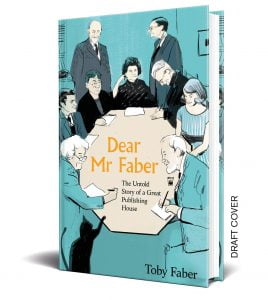Faber tells the story of 90 years of publishing
The year 2019 marks Faber’s ninetieth anniversary as a publisher of distinctive literature, shaping as well as reflecting our times through books and ideas.
Today Faber launches a publishing programme that will celebrate the company’s unique history, authors and design heritage, as part of a magnificent spring list. Our spring catalogue introduces a specially commissioned design for the year.

The year begins with Faber Stories (January), a landmark series of individual volumes in beautiful paperback livery, showcasing masters of the short story form at work in a range of genres and styles. Faber Social offers The Greatest Hits (February), the reissue of six momentous publications that have taken writing about music in new and exciting directions for the twenty-first century. In September, the poetry list is celebrated decade by decade, with ten iconic collections of Faber poetry.
May sees the publication of Dear Mr Faber: The Untold Story of a Great Publishing House. With every passing decade, Faber’s continuing independence becomes more remarkable. This story is told through the words of the staff and authors who lived it – in letters, memoirs and diary entries that capture the excitement, hopes, fears and triumphs of ninety years of Faber.
Faber Children’s ushers in its ninetieth programme with Old Toffer’s Book of Consequential Dogs (September 2018), a canine rejoinder to Old Possum’s Book of Practical Cats, which celebrates its eightieth anniversary in 2019. Faber’s love of cats is also commemorated by new editions of the iconic Millions of Cats and one of T. S. Eliot’s most popular cat poems, Cat Morgan. Two cats even grace the new Faber Children’s colophon, specially designed for the year by Júlia Sardà.
The children’s list also features beautiful new editions of Ted Hughes’s acclaimed collections of animal and nature poems.
Faber’s ninetieth branding and jacket design has been conceived and created by Creative Director, Donna Payne, and the Faber design team. Inspiration was taken from Faber’s archive, utilising fonts from the Wolpe Collection, revived by Toshi Omagari of Monotype Studio (Berthold Wolpe was Faber’s illustrious Art Director from 1941–1975). Promotional materials were designed by former Faber designer, Luke Bird.
FABER & FABER: THE UNTOLD STORY OF A GREAT PUBLISHING HOUSE by Toby Faber
MAY 2019 | HARDBACK | £16.99
Eliot, Golding, Hughes, and Plath are synonymous with the name of Faber. But what is the real tale behind the house that brought together these authors? And how did a tiny firm weather the Great Depression, wartime paper shortages, and dramatic financial crises, while managing to retain its independence?
Drawing on letters, minutes, memoirs and diaries, Toby Faber takes us deep inside the evolution of the company and the excitement, hopes and fears of the people who made it what it is today. This is both a vibrant history and a hymn to role of the literature in all our lives.
As the grandson of Faber’s founder, Toby Faber grew up steeped in its books and its stories. He was its Managing Director for four years and remains a non-executive director and Chairman of its affiliate company, Faber Music. He has written two celebrated works of non-fiction, Stradivarius and
‘This is a wonderfully vivid story of our publishing house and it is all told in the words of Faber’s staff and authors. It’s a treat to eavesdrop on the intimate conversations of literary giants like T. S. Eliot, William Golding, Seamus Heaney and P. D. James, and it’s uncanny how similar the publishing discussions are to today’s – whether it is debates about taste and risk, or negotiations over titles and jackets. Berthold Wolpe’s response to Lawrence Durrell’s jacket suggestions is not to be missed!’ Laura Hassan, Editorial Director

FABER STORIES
JANUARY/MARCH 2019 | PAPERBACK | £3.50
Faber Stories, a landmark series of individual volumes, presents masters of the short story form at work in a range of genres and styles.
From precious rediscoveries to gender-playful fictions, futurist fables to uncanny imaginings, here are stories by a new generation of Faber authors alongside Faber classics.
Bringing together past, present and future in our ninetieth year, Faber Stories is a celebratory compendium of collectable work. The selection has been put together in collaboration with Gaby Wood.
‘It’s been an incredible pleasure, and a privilege, to search for short stories among the extraordinary group of authors Faber has assembled throughout its history. In the course of that reading, much that was unexpected emerged: a range of genres and generations, a wide geographical span, writers who seemed like relatives of one another (intentionally or not) – and some precious discoveries, never previously published. (Indeed, there’s a surprise title soon to be announced.)
Each of these stories offers a different answer to the question of what it means to be a master of the form, and the associations between them have given this set its shape. However, anyone scanning its titles will see that there’s room for many more.’ Gaby Wood
Robert Aickman – The Inner Room
Brian Aldiss – Three Types of Solitude
Djuna Barnes – The Lydia Steptoe Stories
Samuel Beckett – Dante and the Lobster
Alan Bennett – The Shielding of Mrs Forbes
Petina Gappah – An Elegy for Easterly
Sarah Hall – Mrs Fox
Kazuo Ishiguro – Come Rain or Come Shine
P. D. James – The Victim
Thom Jones – Sonny Liston Was a Friend of Mine
Claire Keegan – The Forester’s Daughter
John McGahern – The Country Funeral
David Means – A River In Egypt
Lorrie Moore – Terrific Mother
Edna O’Brien – Paradise
Flannery O’Connor – A Good Man is Hard to Find
Julia O’Faolain – Daughters of Passion
Sally Rooney – Mr Salary
Akhil Sharma – Cosmopolitan

FABER SOCIAL GREATEST HITS
FEBRUARY 2019 | PAPERBACK | £6.99
Faber Social Greatest Hits are new editions of books that have taken writing about music in new and exciting directions for the twenty-first century.
Faber Social will reissue six momentous publications: Clothes, Music, Boys by Viv Albertine, Girl in a Band by Kim Gordon, Lowside of the Road by Barney Hoskyns, The Dark Stuff by Nick Kent, Rip It Up and Start Again by Simon Reynolds and Electric Eden by Rob Young.
Lee Brackstone, Creative Director, said: ‘The publishing on the Faber Social list started with the brief tenure of Pete Townshend in the mid-eighties and continues to this day with a list that represents the most exciting pop and counter-cultural narratives of the times. These first six titles are contemporary classics and pillars of a music list that is unrivalled, and will continue to deliver the best artists and writers in the English language as Faber strides forward into its tenth decade.’

90TH ANNIVERSARY POETRY EDITIONS
SEPTEMBER 2019 | HARDBACK | £10
Ten of our most iconic collections of poetry, one from each decade, are reissued in this special series to celebrate ninety years of Faber publishing. With distinctive new covers and endpapers commissioned from a range of renowned printmakers, textile designers and pattern-makers, they represent the strength and richness of Faber’s poetry heritage.
To celebrate each decade, Faber will republish T. S. Eliot’s The Waste Land (1920s), Marianne Moore’s Selected Poems (1930s), W. H. Auden’s Another Time (1940s), Ted Hughes’s The Hawk in the Rain (1950s) and Sylvia Plath’s Ariel (1960s).
Faber will also republish Philip Larkin’s High Windows (1970s), Seamus Heaney’s The Haw Lantern (1980s), Wendy Cope’s Serious Concerns (1990s), Jo Shapcott’s Of Mutability (2000s) and Daljit Nagra’s Look We Have Coming to Dover! (2010s).

FABER CHILDREN’S CELEBRATES CATS!
Faber has commissioned a new children’s logo from Júlia Sardà, a rising star illustrator from Barcelona.
Sardà’s elegant, playful style and sophisticated line felt the perfect fit for a design that needed to reflect not just Faber’s heritage, but its independent standing, idiosyncratic identity and reputation for literary quality.
Cats have been part of Faber’s children’s publishing from the beginning. In 1939, Faber published
T. S. Eliot’s Old Possum’s Book of Practical Cats, which turns eighty next year. Cat Morgan, the inspiration for one of Eliot’s poems, was a real cat who prowled the corridors and sat in on acquisitions meetings of old. Faber’s very first children’s book was Wanda Gág’s Millions of Cats, a classic text that will be reissued in the Faber Heritage picture book series.
Also joining the cat celebrations in 2019 are Universal Pictures, who are making an exciting new film, CATS, based on the ever-popular musical. Old Possum’s Book of Practical Cats will also feature in Cats on the Page, an exhibition at the British Library opening on 23 November 2018, celebrating cats in literature, from our childhood stories to favourite rhymes.
In 1931, Tom Faber, who was not yet four, received a letter from his godfather, T. S. Eliot, telling of his ‘Lilliecat’ Jellylorum, whose one idea was to be ‘USEFUL!!’. Enchanted, the young boy told his parents, ‘I think Uncle Tom’s a very good writer’.That little boy, Tom Faber, was my father. I like to believe it was his godson’s encouragement which encouraged T. S. Eliot to think he could write poems for children. So it was that various cat poems appeared in letters over the years, but it was not until 1939 that they were collected in the now world-famous Old Possum’s Book of Practical Cats.
That might have been the end of the cat poems were it not for the arrival of Morgan, a very large, black cat who fastened himself on Faber’s offices in Russell Square soon after the outbreak of the Second World War. Apparently Morgan would keep Geoffrey Faber, T. S. Eliot and their colleagues company during the long night hours as they watched for bombs from the roof of the publishing house. In 1951, another poem appeared in which Cat Morgan introduced himself. For obvious reasons, it’s one of my favourites among all Old Possum’s poems.
Toby Faber, grandson of Geoffrey Faber, founder of Faber & Faber
